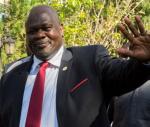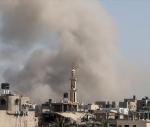You are here
Assad secure, will seek reelection — Hizbollah leader
By Reuters - Apr 07,2014 - Last updated at Apr 07,2014
BEIRUT — Syrian President Bashar Assad will stand for re-election this year and no longer faces a threat of being overthrown, the head of his Lebanese Shiite ally Hizbollah said in an interview published on Monday.
Hizbollah Secretary General Sayyed Hassan Nasrallah, whose fighters have been supporting Assad inside Syria, also said that after three years of conflict the danger of the country fragmenting was receding.
Assad has lost control of large swathes of northern and eastern Syria to Syrian Islamist rebels and foreign jihadis. But his forces, backed by Hizbollah, Iraqi Shiite Muslim fighters and Iranian military commanders, have driven rebels back from around Damascus and secured most of central Syria.
“In my estimation, the phase of overthrowing the regime and overthrowing the state is over,” Nasrallah told Al Safir newspaper, adding that he believed Assad would put himself forward for a third presidential term in a vote due by July.
“It’s natural that he nominates himself, and I believe that will happen,” Nasrallah said of the planned vote expected to take place despite ongoing conflict and massive displacement within Syria. Assad’s international foes have said the poll would be a “parody of democracy”.
Rebels “cannot overthrow the regime [but] they can wage a war of attrition,” Nasrallah said. “The real danger was, and still is to a certain extent, the end of Syria, its fragmentation. The danger was real and serious... I think we have passed the danger of fragmentation.”
More than 150,000 people have been killed in Syria’s civil war, according to the Syrian Observatory for Human Rights monitoring group. A third of those were pro-Assad forces, including 364 Hizbollah fighters, it said.
Nasrallah dismissed rebel gains over the last two weeks in the coastal province of Latakia — a stronghold of Assad’s minority Alawite faith where rebels have seized the Kasab border crossing — as little more than a distraction.
“We can’t call what is happening in Latakia and Kasab a big battle ... it’s a limited operation,” he said, adding that talk of a big rebel offensive in the southern province of Deraa on the Jordanian border had also been overstated.
As the military threat against Assad eased, so too would the political pressure “starting with Saudi Arabia and Qatar”, Nasrallah said, pointing to two Sunni Muslim Gulf Arab states who have backed the mainly Sunni rebels battling Assad.
“I’m not saying they have changed their positions, but the strength of their stances, the level of their intervention and the hopes that they had, have changed a lot,” he said — in contrast to what he described as the unflinching support Assad enjoyed from his own allies.
Syria war fuels tensions
Shiite Hizbollah’s intervention in Syria, alongside the flow of Sunni fighters and weapons from Lebanon to support the rebels, has fuelled sectarian tensions inside Lebanon.
Radical Sunni groups have claimed responsibility for car bombs which targeted the southern Beirut suburbs where Hizbollah holds sway, and rockets have also struck Shiite and Sunni towns in the Bekaa Valley.
Lebanese Sunni politicians have criticised Hizbollah, which was set up three decades ago to fight Israeli occupation forces in the south of the country, for wading into an Arab conflict.
But Nasrallah denied that his group’s military role in Syria was losing it popularity, saying its campaign against Syrian rebels near the Lebanese border was helping reduce the risk of bombings inside Lebanon.
Even some members of Lebanon’s anti-Hizbollah March 14 coalition tacitly supported the group’s actions, he said.
“There is a strong popular mood which supports Hizbollah’s intervention in Syria. Many Lebanese, even within March 14, deep down they believe and accept that intervention in Syria protects Lebanon from these terrorist groups.”
Nasrallah also said Hizbollah was responsible for a bombing of an Israeli border patrol in March, saying the attack was in response to an Israeli air strike against a Hizbollah target on the Syrian-Lebanese border a month earlier.
“The Shebaa Farms bomb ... was the work of the resistance, the work of Hizbollah,” he said. “The is not the [full] response, but part of the response to the Israeli raid.”
He appeared to be referring to a March 14 incident when Israel’s military said an explosive device was detonated against Israeli soldiers patrolling the border with Lebanon. Israel shot six mortars into southern Lebanon in response, but no one was wounded on either side, security and military sources said.
Related Articles
QAA, Lebanon — The barren mountains separating the Lebanese village of Qaa from Syria have helped shield it from the war raging next door, y
An Al Qaeda-linked Syrian rebel group has released five members of the Lebanese security forces captured earlier last month in a cross-border raid, Lebanon's military said Sunday.
Al Qaeda's Syria affiliate called on the Lebanese authorities Saturday to discuss its terms for the release of dozens of captive troops, after three of them were executed.
















